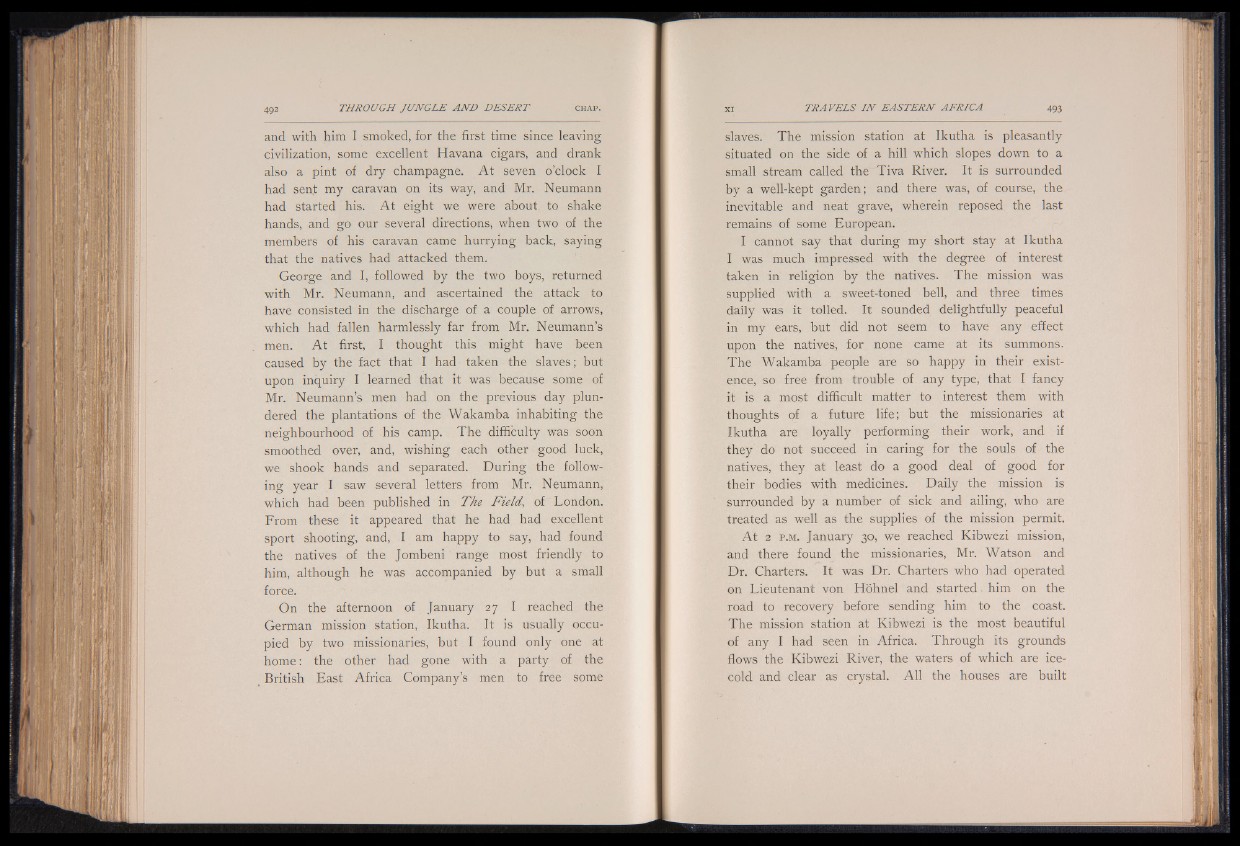
and with him I smoked, for the first time since leaving
civilization, some excellent Havana cigars, and drank
also a pint of dry champagne. A t seven o’clock I
had sen.t my caravan on its way, and Mr. Neumann
had started his. A t eight we were about to shake
hands, and go our several directions, when two of the
members of his caravan came hurrying back, saying
that the natives had attacked them.
George and I, followed by the two boys, returned
with Mr. Neumann, and ascertained the attack to
have consisted in the discharge of a couple of arrows,
which had fallen harmlessly far from Mr. Neumann’s
men. A t first, I thought this might have been
caused by the fact that I had taken the slaves; but
upon inquiry I learned that it was because some of
Mr. Neumann’s men had on the previous day plundered
the plantations of the Wakamba inhabiting the
neighbourhood of his camp. The difficulty was soon
smoothed over, and, wishing each other good luck,
we shook hands and separated. During the following
year I saw several letters from Mr. Neumann,
which had been published in The Field, of London.
From these it appeared that he had had excellent
sport shooting, and, I am happy to say, had found
the natives of the Jombeni range most friendly to
him, although he was accompanied by but a small
force.
On the afternoon of January 27 I reached the
German mission station, Ikutha. It is usually occupied
by two missionaries, but I found only one at
home: the other had gone with a party of the
British East Africa Company’s men to free some
slaves. The mission station at Ikutha is pleasantly
situated on the side of a hill which slopes down to a
small stream called the Tiva River. It is surrounded
by a well-kept garden; and there was, of course, the
inevitable and neat grave, wherein reposed the last
remains of some European.
I cannot say that during my short stay at Ikutha
I was much impressed with the degree of interest
taken in religion by the natives. The mission was
supplied with a sweet-toned bell, and three times
daily was it tolled. It sounded delightfully peaceful
in my ears, but did not seem to have any effect
upon the natives, for none came at its summons.
The Wakamba people are so happy in their existence,
so free from trouble of any type, that I fancy
it is a most difficult matter to interest them with
thoughts of a future life; but the missionaries at
Ikutha are loyally performing their work, and if
they do not succeed in caring for the souls of the
natives, they at least do a good deal of good for
their bodies with medicines. Daily the mission is
surrounded by a number of sick and ailing, who are
treated as well as the supplies of the mission permit.
At 2 p .m. January 30, we reached Kibwezi mission,
and there found the missionaries, Mr. Watson and
Dr. Charters. It was Dr. Charters who had operated
on Lieutenant von Hohnel and started him on the
road to recovery before sending him to the coast.
The mission station at Kibwezi is the most beautiful
of any I had seen in Africa. Through its grounds
flows the Kibwezi River, the waters of which are ice-
cold and clear as crystal. All the houses are built